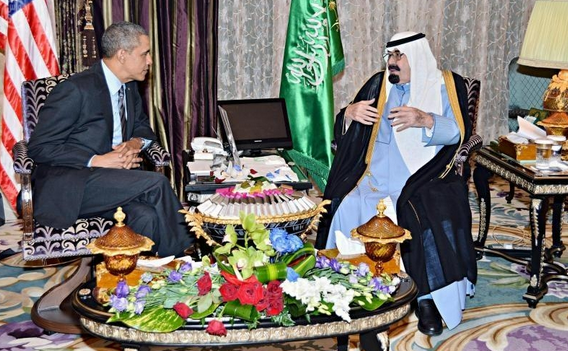U.S. Secretary of State John Kerry lauded Saudi Arabia’s “compassion” and “generosity” after the Kingdom announced it would donate $500 million in humanitarian aid to all people of Iraq, regardless of ethnicity or religion, according to a release made public by the State Department.
“Saudi Arabia has made an enormous and very significant commitment to help its neighbor, underscoring that the entire region has a stake in seeing Iraq overcome today’s crisis, and achieve stability,” Secretary said in the release.
Kerry, fresh off a recent trip to visit Saudi Arabia’s King Abdullah and other senior Saudi officials in Jeddah last weekend, underscored Saudi Arabia’s “powerful statement of solidarity” with those displaced or affected by the ISIL-led aggression in Iraq. “Saudi Arabia’s strong show of support will be crucial to alleviating the suffering of all Iraqis displaced by the violence,” the release said.
The urgency of the Saudi Arabian government to overthrow Syrian President Bashar al-Assad has stoked rumors that Saudi Arabia, whose ethnic makeup is primarily Sunni, previously supported ISIL in Syria against government forces. The Atlantic’s Steve Clemons, who spoke exclusively with SUSTG on the subject last week in this video interview, wrote in a last week that “ISIS, in fact, may have been a major part of [Saudi Prince] Bandar’s covert-ops strategy in Syria.” Prince Bandar, a former Saudi Ambassador to the United States for decades, was recently the former head of Saudi intelligence in charge of the Syria portfolio before being removed from the post.
But Fahad Nazer, analyst with JTG Inc and a frequent media commentator, said that accusations that Saudi Arabia – at the government level – is supporting ISIL “defies common sense.”
“It is one thing for casual observer to jump to that conclusion and it is something else for experts to essentially make the same argument,” Nazer told a SUSTG/SUSRIS FocusKSA online discussion last week. “I’ve come across a number of articles by fairly well-respected analysts that are essentially at least – the titles imply – that there is indeed a relationship between Saudi Arabia and [ISIS] and that it is somehow an official relationship. What’s interesting is that if you read the actual articles, invariably, just about everybody at some point adds a caveat saying ‘there’s no actual real evidence suggesting that’ but they still make the argument,” Nazer said.
During Secretary Kerry’s visit to Saudi Arabia last Friday, the King flatly rejected any support for ISIL, even raising that topic “preemptively,” according to a State Department statement after the meeting last week. The Department said Secretary Kerry and King Abdullah, as well as Saudi Foreign Minister Saud al Faisal and other officials, “talked about ISIL. They agreed and shared a deep concern about the threat that ISIL is posing inside Iraq and inside Syria but also to the region.”
Nouf al-Sadiq, a Saudi student in the United States writing for the Atantic Council, noted that although ISIL’s advance in Iraq is a grave concern for Saudi Arabia, “they do not view the threat from ISIS as the only risk to their interests….Gulf officials and analysts blame Prime Minister Nouri al-Maliki for creating an intensely sectarian climate. They fear that Iran will gain an additional advantage if it takes a larger role in support of the Shia in Iraq.”
Meanwhile, a recent shake-up in the Saudi government this week appointing Prince Bandar bin Sultan as Advisor to King Abdullah, and Prince Khalid bin Bandar to Chief of General Intelligence has analysts speculating about the implications of the move, particularly related to the unfolding situation in Iraq. As Reuters reports, it is unclear whether Bandar’s new appointment means he will return to playing an active role in Saudi security and foreign policy.
Prince Bandar bin Sultan, who is rarely publicly photographed, appeared in two photos last week released by the Saudi Press Agency on its website, accompanying King Abdullah on an official state visit to Egypt to meet with the newly elected President Abdel Fattah al-Sisi, along with other Saudi officials.
Saudi Arabia shares an 814km border with Iraq. In 2007, the Saudi government issued tenders for a border fence similar to the construction implemented on the Kingdom’s border with Yemen to the south, according to a 2009 book on Saudi Arabia’s national security by Anthony Cordesman, a Saudi expert at the Center for Strategic and International Studies (CSIS), but the status of that project is unknown.
In 2010, Saudi Arabia made the largest arms purchase in U.S. history totaling $60 billion in U.S. equipment, helicopters, fighter jets, and training. A recently completed military exercise with Saudi Arabia, the United States, Jordan, Turkey and the United Kingdom called Operation ‘Eager Lion’ featured Saudi Arabian F-15 jets in the counterattack simulation. Operation ‘Eager Lion’ is a recurring, multi-national military exercise “designed to strengthen military-to-military relationships and enhance regional security and stability by responding to modern-day security scenarios,” according to the U.S. Naval Forces Central Command.
–
Lucien Zeigler is research director of SUSTG.









